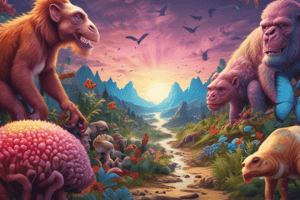Podcast
Questions and Answers
What explains how life on Earth changes over time?
What explains how life on Earth changes over time?
The scientific theory of evolution
What process do populations undergo when genes mutate and enhance survival traits?
What process do populations undergo when genes mutate and enhance survival traits?
Natural selection
Which factors affect biological evolution? (Select all that apply)
Which factors affect biological evolution? (Select all that apply)
- Volcanic eruptions (correct)
- Tectonic plate movements (correct)
- Earthquakes (correct)
- Climate change (correct)
What are tectonic plates?
What are tectonic plates?
Earthquakes can cause the extinction of species.
Earthquakes can cause the extinction of species.
What effect can volcanic eruptions have on biological evolution?
What effect can volcanic eruptions have on biological evolution?
What is biodiversity?
What is biodiversity?
Why is biodiversity important?
Why is biodiversity important?
Flashcards are hidden until you start studying
Study Notes
Evolution and Biodiversity
- Evolution is the process of change in species over time due to genetic changes in populations.
- Natural selection acts on genetic mutations that provide survival advantages, allowing these traits to be passed on to offspring.
- Biological evolution refers to how life on Earth changes through these genetic differentiations.
Factors Affecting Biological Evolution
- Tectonic Plate Movements: Movement of tectonic plates influences species distribution, habitat availability, and environmental adaptations, promoting the evolution of new species.
- Volcanic Eruptions: Eruptions can destroy habitats, leading to reductions in species populations or outright extinction. Some species may adapt to new volcanic landscapes over time.
- Earthquakes: These can create barriers that isolate populations, which over long periods can lead to speciation as isolated groups adapt to their unique environments.
Climate Change and Its Impact
- Historical climate shifts have alternated between warming and cooling, significantly impacting biodiversity through the expansion and retreat of species and ecosystems.
- Rapid climate changes can lead to extinction if species cannot adapt quickly enough, while new species may evolve to fill ecological niches left vacant by extinct species.
- Catastrophic events, including asteroid impacts, have historically led to mass extinctions and ecosystem alterations, creating opportunities for new species development.
Biodiversity Defined
- Biodiversity encompasses the variety of life on Earth, including all microorganisms, plants, animals, and ecosystems like coral reefs and forests.
- It includes species richness, genetic diversity, and ecosystem diversity, all vital for sustaining life processes like energy flow and nutrient cycling.
Importance of Biodiversity
- Ecosystem Balance: Essential for recycling nutrients, combating pollution, stabilizing the climate, and protecting water resources.
- Biological Resources: Provides medicines, food, and ornamental plants, illustrating the practical benefits of preserving biodiversity.
- Biodiversity maintains ecological balance, supports healthy ecosystems, and is crucial for environmental resilience.
Studying That Suits You
Use AI to generate personalized quizzes and flashcards to suit your learning preferences.




